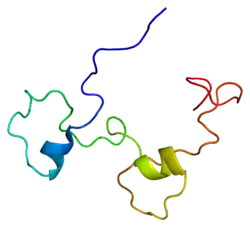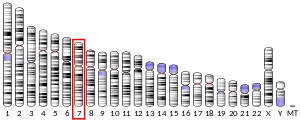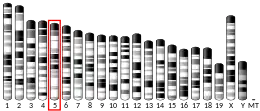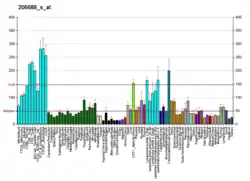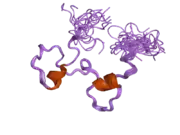Cleavage and polyadenylation specificity factor subunit 4 is a protein that in humans is encoded by the CPSF4 gene.[5][6][7]
Inhibition of the nuclear export of poly(A)-containing mRNAs caused by the influenza A virus NS1 protein requires its effector domain. The NS1 effector domain functionally interacts with the cellular 30 kDa subunit of cleavage and polyadenylation specific factor 4, an essential component of the 3' end processing machinery of cellular pre-mRNAs.
In influenza virus-infected cells, the NS1 protein is physically associated with cleavage and polyadenylation specific factor 4, 30kD subunit. Binding of the NS1 protein to the 30 kDa protein in vitro prevents CPSF binding to the RNA substrate and inhibits 3' end cleavage and polyadenylation of host pre-mRNAs.
Thus the NS1 protein selectively inhibits the nuclear export of cellular, and not viral, mRNAs. Multiple alternatively spliced transcript variants that encode different isoforms have been described for this gene.[7]
References
- 1 2 3 GRCh38: Ensembl release 89: ENSG00000160917 - Ensembl, May 2017
- 1 2 3 GRCm38: Ensembl release 89: ENSMUSG00000029625 - Ensembl, May 2017
- ↑ "Human PubMed Reference:". National Center for Biotechnology Information, U.S. National Library of Medicine.
- ↑ "Mouse PubMed Reference:". National Center for Biotechnology Information, U.S. National Library of Medicine.
- ↑ Nemeroff ME, Barabino SM, Li Y, Keller W, Krug RM (Jul 1998). "Influenza virus NS1 protein interacts with the cellular 30 kDa subunit of CPSF and inhibits 3'end formation of cellular pre-mRNAs". Mol Cell. 1 (7): 991–1000. doi:10.1016/S1097-2765(00)80099-4. PMID 9651582.
- ↑ Barabino SM, Hubner W, Jenny A, Minvielle-Sebastia L, Keller W (Aug 1997). "The 30-kD subunit of mammalian cleavage and polyadenylation specificity factor and its yeast homolog are RNA-binding zinc finger proteins". Genes Dev. 11 (13): 1703–16. doi:10.1101/gad.11.13.1703. PMID 9224719.
- 1 2 "Entrez Gene: CPSF4 cleavage and polyadenylation specific factor 4, 30kDa".
Further reading
- Jenny A, Hauri HP, Keller W (1994). "Characterization of cleavage and polyadenylation specificity factor and cloning of its 100-kilodalton subunit". Mol. Cell. Biol. 14 (12): 8183–90. doi:10.1128/MCB.14.12.8183. PMC 359357. PMID 7969155.
- Thuresson AC, Aström J, Aström A, et al. (1994). "Multiple forms of poly(A) polymerases in human cells". Proc. Natl. Acad. Sci. U.S.A. 91 (3): 979–83. Bibcode:1994PNAS...91..979T. doi:10.1073/pnas.91.3.979. PMC 521437. PMID 8302877.
- Hillier LD, Lennon G, Becker M, et al. (1997). "Generation and analysis of 280,000 human expressed sequence tags". Genome Res. 6 (9): 807–28. doi:10.1101/gr.6.9.807. PMID 8889549.
- McCracken S, Fong N, Yankulov K, et al. (1997). "The C-terminal domain of RNA polymerase II couples mRNA processing to transcription". Nature. 385 (6614): 357–61. Bibcode:1997Natur.385..357M. doi:10.1038/385357a0. PMID 9002523. S2CID 4307073.
- de Vries H, Rüegsegger U, Hübner W, et al. (2000). "Human pre-mRNA cleavage factor II(m) contains homologs of yeast proteins and bridges two other cleavage factors". EMBO J. 19 (21): 5895–904. doi:10.1093/emboj/19.21.5895. PMC 305781. PMID 11060040.
- Strausberg RL, Feingold EA, Grouse LH, et al. (2003). "Generation and initial analysis of more than 15,000 full-length human and mouse cDNA sequences". Proc. Natl. Acad. Sci. U.S.A. 99 (26): 16899–903. Bibcode:2002PNAS...9916899M. doi:10.1073/pnas.242603899. PMC 139241. PMID 12477932.
- Scherer SW, Cheung J, MacDonald JR, et al. (2003). "Human chromosome 7: DNA sequence and biology". Science. 300 (5620): 767–72. Bibcode:2003Sci...300..767S. doi:10.1126/science.1083423. PMC 2882961. PMID 12690205.
- Kaufmann I, Martin G, Friedlein A, et al. (2005). "Human Fip1 is a subunit of CPSF that binds to U-rich RNA elements and stimulates poly(A) polymerase". EMBO J. 23 (3): 616–26. doi:10.1038/sj.emboj.7600070. PMC 1271804. PMID 14749727.
- Gerhard DS, Wagner L, Feingold EA, et al. (2004). "The status, quality, and expansion of the NIH full-length cDNA project: the Mammalian Gene Collection (MGC)". Genome Res. 14 (10B): 2121–7. doi:10.1101/gr.2596504. PMC 528928. PMID 15489334.
- Rual JF, Venkatesan K, Hao T, et al. (2005). "Towards a proteome-scale map of the human protein-protein interaction network". Nature. 437 (7062): 1173–8. Bibcode:2005Natur.437.1173R. doi:10.1038/nature04209. PMID 16189514. S2CID 4427026.
- Oh JH, Yang JO, Hahn Y, et al. (2006). "Transcriptome analysis of human gastric cancer". Mamm. Genome. 16 (12): 942–54. doi:10.1007/s00335-005-0075-2. PMID 16341674. S2CID 69278.
- Twu KY, Kuo RL, Marklund J, Krug RM (2007). "The H5N1 influenza virus NS genes selected after 1998 enhance virus replication in mammalian cells". J. Virol. 81 (15): 8112–21. doi:10.1128/JVI.00006-07. PMC 1951328. PMID 17522219.
External links
- Human CPSF4 genome location and CPSF4 gene details page in the UCSC Genome Browser.
- Overview of all the structural information available in the PDB for UniProt: O95639 (Cleavage and polyadenylation specificity factor subunit 4) at the PDBe-KB.
